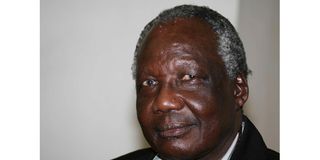Go gently into the night, ‘lofty’ language user Philip Ochieng

Veteran journalist and wordsmith Philip Ochieng.
My favourite pieces of Philip Ochieng’s writing are when wrote about books and poems he had read and the people he liked.
When he wrote the obituary Whence cometh another heroine, he put his heart into describing Prof Wangari Maathai, the woman he called MaryJo Wangari.
In doing so, Ochieng gave us a snapshot of the relationships he formed in the US when he was part of the airlift programme and a glimpse of the man he was.
He was not afraid to admit he had been wrong and she had been right about the environment.
His tribute to Pamela Mboya – who he referred to as Pamela Arwa – was warm, heartfelt and informative with subtle nuances of the Luo culture thrown in. Pamela’s tribute brought to life for me a woman I had never met.
And that was the genius of Ochieng. He brought narratives to life through warm humane pieces of writing. He could be scathing but was incisive.
A lot has been said about his lofty use of language and his disdain for shallow users of English. The words “academic Lilliputians” have been used, but PO’s real power lay in his ability to capture the reader’s mind with incisive writing and memorable imagery.
But for me, this man Ochieng’ Otani was not only a genius – he was my idea of the perfect editor – real in his writing, encouraging and chiding to the rest of us who could never aspire to his heights.
He responded to my email commentary for many years before I ever met him.
I would comment on his columns, he would school me on literal matters. And school me he did.
I once dared to ask him what book I may pick for him while travelling. He was clear in his preference: “Bring me something you imagine would chemsha (boil) my brain – some non-fiction work.”
PO did speak Kiswahili at times and I have the records to prove it!
In the end, I had two books delivered to him – How Starbucks Saved My Life by Michael Gates Gill and Fathers and Sons by Alexander Waugh.
He ignored the Starbucks book. Ochieng actually never referred to it. He wrote me an email about Alexander Waugh and his father Evelyn Waugh, who wrote the definitive book Snoop.
He really liked Fathers and Sons. May I mention that the Starbucks book still remains my favourite of the two and and that I have not finished reading Fathers and Sons? Somehow, PO’s silent rebuke of my choices here failed.
Years later, I finally met PO when he hosted us at his home in Nkoroi. I was completely dazzled that he agreed to host us and have wonderful memories of sitting in the mid-morning sunshine on a verandah, having tea and piping hot mandazi.
He spoke softly, in an amused tone with dry wit, and I listened to him in awe as he chatted about the great men of Kenya and the Luo culture.
The man had so much knowledge.
To know Ochieng Otani was an unforgettable experience and an absolute privilege.
I say goodbye to a man I revered and hoped to impress but know that I never quite did.
And so I counter the word of Dylan Thomas and say to PO, “Go gently into that good night.”





